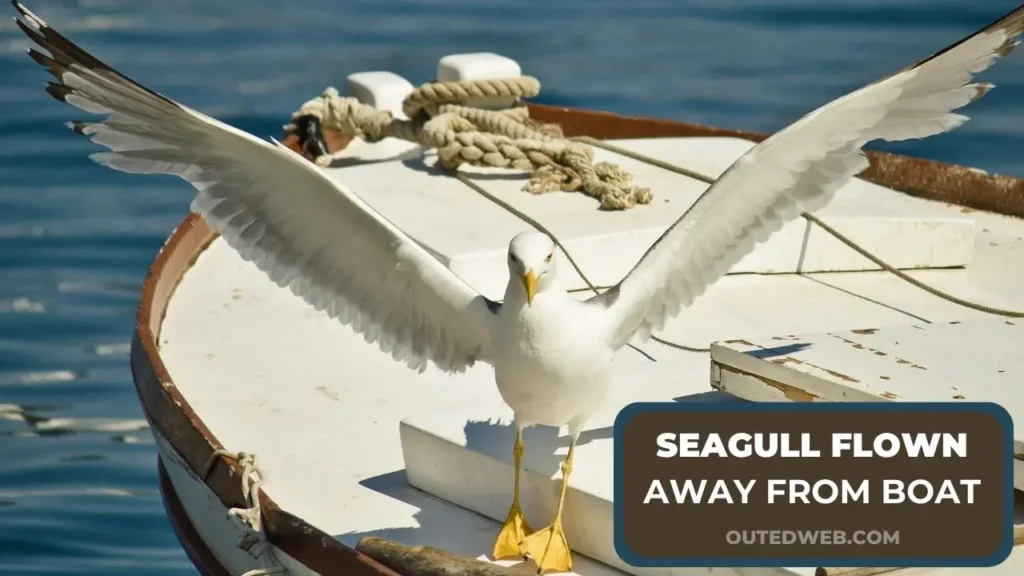You’ve just docked your beloved boat after a thrilling day on the water. As you step onto the deck to secure the ropes, you notice an unwelcome sight: birds perched all over your boat, leaving behind droppings and causing potential damage.
Frustration sets in as you wonder how to keep these feathered intruders at bay and protect your vessel.
Don’t fret! We’ve covered you with effective strategies to keep birds off your boat.
From tried-and-true methods to innovative deterrents, there are various approaches you can take to reclaim your boat from these avian invaders.
By implementing these solutions, you’ll be able to maintain a clean and bird-free environment for your precious vessel.
This comprehensive guide will delve into practical techniques that will help you tackle the bird problem head-on. So, fasten your life jacket and prepare to journey to reclaim your boat from these unwelcome visitors.
Read Related Articles:
Why Are Birds Attracted to Boats?
Birds can adapt to new situations, so it’s no wonder they are drawn to boats. Boats appeal to them for a multitude of reasons. We can build effective ways to keep them away from our ships if we understand their motivations.
Seeking Shelter and Resting Spots
A group of seagulls flew through the air, seeking a safe perch and rest. With their elevated decks and masts, boats provide birds with ideal vantage points for observing their surroundings while offering protection from predators.
The openness of the boat provides a perch that affords a clear view of potential food sources in the water.
Availability of Food Sources
Birds are opportunistic feeders, and boats can provide a convenient source of nourishment. As you sail or fish, remnants of bait or discarded food may inadvertently become available to birds.
The presence of fish scraps, crumbs, or other food particles can attract seabirds and gulls, turning your boat into a potential feeding ground.
Safe Nesting Opportunities
For some bird species, boats serve as an attractive nesting site. The nooks, crannies, and hidden corners of a boat can mimic the natural crevices found in cliffs or trees where birds typically build their nests.
The sheltered and elevated nature of boats can offer protection from ground-based predators, making them an appealing choice for nesting.
Perception of Safety and Lack of Threat
Birds are quick to identify areas where they feel safe and free from potential threats.
Boats, especially those in marinas or docks, are often bustling with human activity, resulting in birds perceiving them as relatively safe environments.
The constant presence of people can deter predators and provide a sense of security for birds, encouraging them to linger and explore.
Attracted by Reflections and Light
Birds, particularly certain species like gulls, are naturally attracted to shiny objects and reflections.
The sparkling sunlight bouncing off the water can draw their attention to boats, which often have reflective surfaces, such as metal fittings, windows, or polished hulls.
These reflections can create an optical illusion that tricks birds into perceiving these areas as potential food sources or attractive perching spots.
What Are The Risks Associated With Bird Presence on Boats?
While birds may seem harmless, their presence on boats can pose various risks and challenges.
Now, we will explore the potential hazards and inconveniences associated with birds roosting, nesting, and leaving their droppings on your boat.
Understanding these risks will highlight the importance of taking proactive measures to keep birds away from your vessel.
Damage to Boat Surfaces and Equipment
Bird droppings contain uric acid, highly corrosive and destructive to boat surfaces like paint, fiberglass, and metal fittings.
If left untreated, these acidic droppings can lead to discoloration, staining, and deterioration of your boat’s aesthetic appeal.
Additionally, birds may peck at or scratch delicate equipment such as antennas, canvas covers, and wiring, causing potential damage and costly repairs.
Health and Hygiene Concerns
Bird droppings not only pose a risk to your boat but also present health and hygiene concerns. Droppings can harbor bacteria, fungi, and parasites that can harm you, your passengers, and your dogs’ health.
The inhalation of dried bird droppings can release harmful particles into the air, potentially causing respiratory issues. Additionally, the presence of droppings and feathers can create unsanitary conditions, compromising the cleanliness and comfort of your boat.
Safety Hazards and Nuisance
Birds, especially larger species like seagulls, can be territorial and aggressive when defending their nests or seeking food. This can pose safety risks to boat owners, passengers, and other individuals in the vicinity.
The constant presence of birds on your boat can create an unpleasant and noisy environment, detracting from the peaceful and enjoyable boating experience you desire.
Potential Spread of Diseases
Birds, particularly gulls, and pigeons, are known carriers of various diseases, including salmonellosis, histoplasmosis, and avian influenza.

The presence of these birds on your boat increases the risk of contamination and the potential spread of diseases to humans and other animals.
Proper precautions must be taken to minimize the chances of exposure to bird-borne pathogens.
Negative Impact on Aesthetics and Resale Value
The accumulation of bird droppings, feathers, and nests on your boat can significantly impact its aesthetics and resale value.
A boat covered in bird mess may not only deter potential buyers but also require extensive cleaning and restoration efforts to restore its visual appeal.
Maintaining a bird-free boat environment will help preserve its attractiveness and ensure a higher resale value in the future.
How Can You Scare Birds Away From Your Boat?
Now that we understand the risks associated with birds on boats, it’s crucial to explore effective methods to scare them away.
Visual Deterrents
Visual deterrents are effective in creating an intimidating or uncomfortable environment for birds. Some popular visual deterrents include:
Scarecrow Decoys: Placing scarecrow decoys on your boat can deter birds by creating the illusion of a predator presence. Birds are naturally wary of potential threats, and the sight of a scarecrow can discourage them from landing on your boat.
Reflective Devices: Utilize reflective devices such as mirrors, reflective tapes, or CDs to create flashes of light that startle and confuse birds. Hang these items around your boat, especially in areas where birds tend to congregate, to make the environment less appealing to them.
Auditory Deterrents
Birds are sensitive to sound, making auditory deterrents an effective method to scare them away. Consider the following techniques:
Ultrasonic Devices: Install ultrasonic devices that emit high-frequency sounds specifically designed to repel birds. These sounds are inaudible to humans but irritating to birds, encouraging them to seek quieter areas away from your boat.
Distress Calls: Play pre-recorded distress calls of predatory birds or distress sounds of birds in distress to create a sense of danger. These sounds signal potential threats, causing birds to flee the area instinctively.
Physical Barriers
Physical barriers can prevent birds from accessing certain areas of your boat. Consider the following options:
Netting: Install bird netting over vulnerable areas, such as open spaces, masts, and rigging. The netting creates a physical barrier that prevents birds from landing and roosting on your boat.
Monofilament Lines: String monofilament lines across open areas, such as bow to the mast, to create an obstacle for birds. The lines should be placed close enough to deter birds from landing while still allowing easy movement for boating activities.
Environmental Modifications
Making changes to your boat’s environment can discourage birds from roosting. Try the following technique:
Scare Tactics: Incorporate scare tactics like water sprinklers or motion-activated devices that startle birds with sudden movements or bursts of water. The unpredictable nature of these deterrents can discourage birds from returning to your boat.
Are there any natural bird repellents?
While visual and auditory deterrents can be effective in keeping birds away from your boat, you may prefer natural alternatives that are environmentally friendly and safe.
Essential Oils and Herbs
Certain essential oils and herbs have strong scents that birds find unpleasant. Consider the natural repellents listed below:
Peppermint Oil: Birds dislike the strong scent of peppermint oil. Mix a few drops of peppermint oil with water and spray it around the areas where birds tend to gather on your boat. Reapply the solution regularly for the best results.
Citrus Fruits: Birds are repelled by the scent of citrus fruits. Place orange or grapefruit peels strategically around your boat to deter them. Refresh the peels every few days to maintain the scent.

Predator Urine
Birds have a natural fear of predators, and the scent of predator urine can trigger their instinct to avoid certain areas.
Look for commercially available predator urine products, such as those derived from coyotes or foxes, and follow the instructions for proper application.
These products can be sprayed or strategically placed around your boat to create a perceived threat.
Bird-Repelling Plants
Certain plants have properties or scents that birds find unappealing. Consider incorporating these plants near your boat:
Rosemary: The strong scent of rosemary can deter birds. Plant rosemary bushes or place potted rosemary near the areas where birds gather on your boat.
Marigolds: Marigolds produce a scent that repels birds—plant marigolds in pots or flower beds around your boat to discourage birds from approaching.
Reflective Surfaces and Wind Chimes
Birds can be startled by shiny or reflective surfaces and the sound of wind chimes. Consider the following natural repellents:
Aluminum Foil: Hang strips of aluminum foil around your boat, especially in areas where birds tend to gather. The reflective surface will create flashes of light and movement, making the environment less appealing to birds.
Wind Chimes: Install wind chimes near your boat to create sound and movement. The tinkling sound can startle birds and discourage them from staying.
Tips for Maintaining a Bird-Free Boat Environment
Once you have implemented bird deterrents and successfully scared birds away from your boat, it’s essential to maintain a bird-free environment to ensure their continued absence.
Regular Cleaning
Regular cleaning is essential to discourage birds from returning to your boat. Follow these tips:
Remove Droppings: Promptly clean up any bird droppings on your boat using a mild detergent or bird-dropping cleaner. Avoid using harsh chemicals that may damage the boat’s surfaces.

Rinse Off Residue: After removing droppings, thoroughly rinse the area with water to eliminate any remaining residue and minimize odor.
Clean Nests: If you find bird nests on your boat, wear protective gloves and remove them carefully. Dispose of the nests properly, away from your boat, to discourage birds from rebuilding.
Seal Off Entry Points
Preventing birds from accessing certain areas of your boat can significantly reduce the risk of nesting. Consider these strategies:
Install Bird Netting: Place bird netting over open areas, such as exposed seating areas or storage compartments, to create a physical barrier that prevents birds from entering.
Seal Openings and Crevices: Inspect your boat for any gaps, holes, or crevices where birds can enter. Seal them off with caulk or other appropriate sealants to deny birds access to potential nesting sites.
Maintain a Tidy Environment
Keeping your boat clean and minimizing potential food sources can make it less attractive to birds. Follow these suggestions:
Store Food Securely: Keep any food or garbage stored in sealed containers to avoid attracting birds looking for an easy meal.
Remove Food Residues: After enjoying a meal on your boat, thoroughly clean up any food residues or spills to prevent lingering odors that might attract birds.
Final Say
Keeping birds off your boat requires a combination of proactive measures, effective deterrents, and regular maintenance. By understanding why birds are attracted to boats and the risks associated with their presence, you can implement appropriate strategies to scare them away.
Utilizing visual and auditory deterrents, natural repellents, and maintaining a clean environment are all key factors in preventing birds from returning to your boat.
Remember, consistency is vital in maintaining a bird-free boat environment. Regularly clean up bird droppings, seal off entry points, and rotate scare tactics to keep birds on their toes.
If you find that your efforts are not yielding the desired results, consider seeking professional assistance or exploring long-term solutions to keep birds away from your boat.
With patience and persistence, you can create an environment that birds will find unappealing, allowing you to enjoy your time on the water without the hassle of unwanted feathered visitors.

